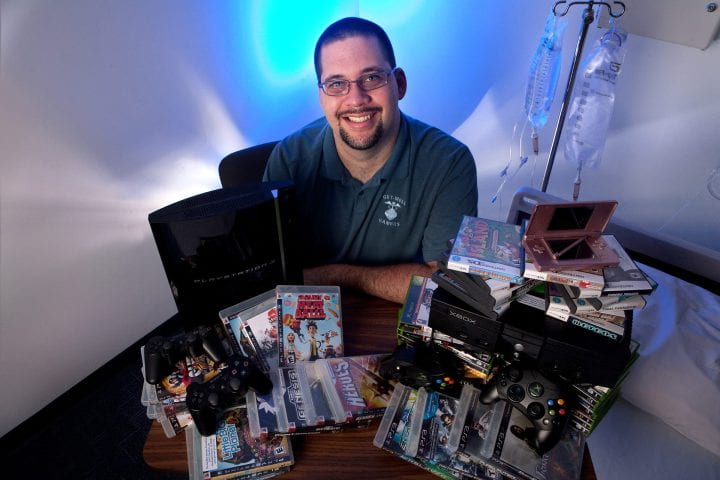Playing the pain away
Alumnus Ryan Sharpe helps hospitalized kids cope via video games.

Ryan Sharpe ’08 was a sickly kid. He estimates that he spent about two years of his childhood at CHOC Children’s Hospital with pneumonia, recurrent bronchitis, blood poisoning and other illnesses.
And for much of that time, his entertainment options were limited to soap operas or game shows. But everything changed when he was 6: Two arcade machines – Zaxxon and Donkey Kong Jr. – were installed in the facility’s break room.
“You forget that you hurt, you don’t feel all the aches and pains, and you don’t notice the needles stuck in your body,” Sharpe says. “It’s just you and the game.”
Now a healthy UC Irvine alumnus, he wants other ailing youngsters to have that same respite. In 2001, he started the Get-Well Gamers Foundation, with the goal of bringing video game systems and games to children’s hospitals.
The nonprofit organization is largely supported by donations from video game developers, publishers and enthusiasts. In his solicitation efforts, Sharpe cites research on the efficacy of interactive video games in pain management.
“Video games engage the auditory, visual, tactile and cognitive centers of the brain to work together toward one goal,” he says. “They literally have the ability to make the brain forget that the body hurts.”
Emily Grankowski, child life manager at CHOC, says the facility is fortunate to have received electronic entertainment systems from the foundation for many years.
“These games are used by patients in our playrooms and at bedside,” she says. “They offer a wonderful diversion during hospitalization, and we greatly appreciate the continued support from this terrific organization.”
While earning an English degree at UCI, Sharpe took programming courses, was a member of the campus Video Game Development Club and worked as a quality assurance tester for Blizzard Entertainment, examining video games for technical glitches.
Now he designs video games on his own, using his English skills to craft compelling story lines.
But a lot of Sharpe’s time is devoted to providing electronic entertainment systems to more than 160 medical facilities in North America through his Get-Well Gamers Foundation.
“Video games are great at bringing people together, especially in hospitals where children might speak only Vietnamese or Spanish,” he says. “Everyone knows the goal of a racing game or a soccer game.”